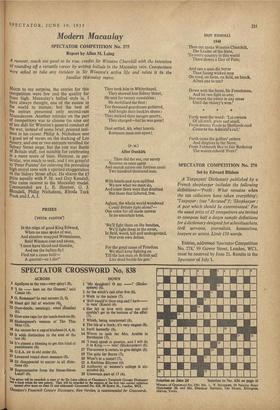A rumour, much too good to be true, credits Sir
Winston Churchill with the intention of rounding ofi a versatile career by writing ballads in the Macaulay vein. Competitors Were asked to take any incident in Sir Winston's active life and relate it in the familiar Macaulay metre.
MucH to my surprise, the entries for this competition were few and the quality far front high. Macaulay's ballad style is, I have always thought, one of the easiest in the world to imitate; but the best of the entries presented only second-rate Macaulayese. Another mistake on the part of competitors was to choose (as nine out Of ten did) Sir Winston's general conduct of the war, instead of some brief, pointed inci- dent in his career. Philip A. Nicholson sent a good set of verses on the ducking of Leo Amery, and one or two entrants versified the Sidney Street siege; but the rest was Battle Of Britain stuff, not suitable for celebrating tO a mere score of lines. Humour, in par- ticular, was much to seek, and I am grateful to 'Peter Painter' for relieving the prevailing high moral tone with a spirited exaggeration of the Sidney Street affair. He shares the 5 Prize equally with P. M. and Guy Kendall, Who came nearest to the Macaulay model. Commended are L. E. Honnor, G. J. Blundell, Philip Nicholson, Rhoda Tuck Pool: and J. A. J.
PRIZES
('PETER PAINTER')
In the reign of good King Edward, When no man spoke of war, And slumber wrapped Westminster, Bold Winston rose and swore, 'I must have blood and thunder, They took him to Whitechapei, They showed him Sidney Street, He sent for twenty constables : He mobilised the fleet : Ten thousand guardsmen gathered, And bright their buckles shone : They stalked their meagre quarry, They charged—but he was gone!
Dust settled. Ah, what laurels Romance must rest upon !
(r. M.)
After Dunkirk . . .
Then did the sea, our surety Succour us once again And snatch across our fortress moat Two hundred thousand men.
With hearts and eyes uplifted We saw what we must do, And some there were that doubted But those that faltered, few.
Aghast, the whole world wondered
Could Britain fight alone?— One voice for all made answer
In no uncertain tone.
'We'll fight them on the beaches, We'll tight them in the street, In field, wood, hill and underground, Nor ever own defeat.
For the great cause of Freedom We shall keep fighting on Till the last man on British soil
(OUY KENDALL)
1940
Then out spake Winston Churchill, The Leader of the State, 'To every country in this world There dawns a Day of Fate; And can a man die better Than facing wicked men On road, on farm, on field, on beach.
Albeit one to ten?
Down with the fence, Sir Frenchman, And let two fight as one; Nor count the pence in any sense Until the victory's won.'
• • •
Forth went the word : 'Let owners Of all craft, great and small, From steamy Poole to Shetlands cool Come to the Admiral's call.'
Forth came the golfers' cutters
And dinghies to the Nore;
From Falmouth Bay to fair Rothcsay The waters echoed 'Fore 1'










































 Previous page
Previous page